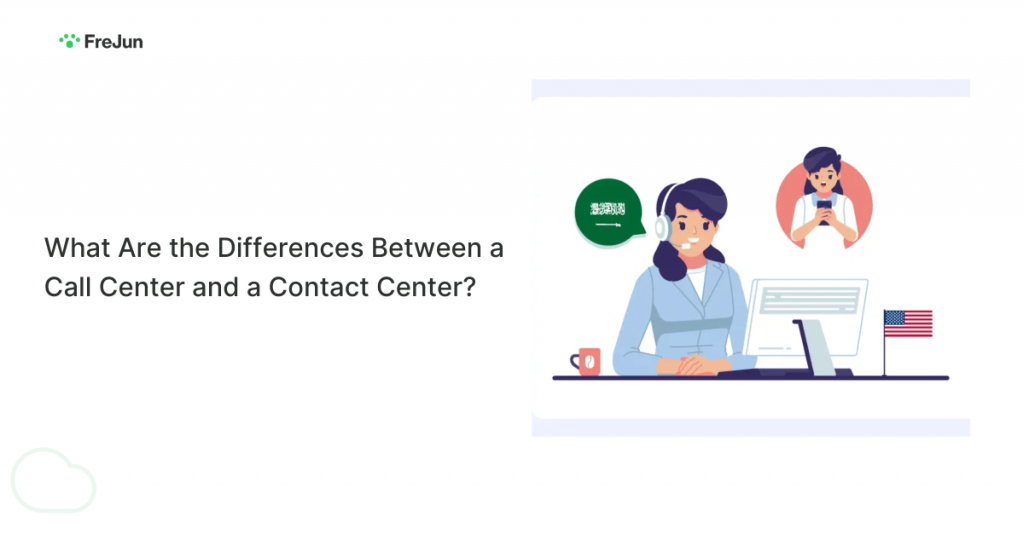Last updated on August 11th, 2025 at 04:35 pm
In today’s digital-first world, businesses need effective ways to interact with their customers. While the terms “call center” and “contact center” are often used interchangeably, they serve different purposes in customer service and engagement. Understanding these differences is essential for businesses looking to enhance their customer experience strategy in 2025. There is a thin line between the definition of a call center and a contact center. This probably explains why many people, even today, use these two terms interchangeably. However, despite seeming similar, there is a world of differences between these two. In this post, we will not only understand the difference between a contact center and a call center but also look into the reasons why a business must invest in either of them.
Table of contents
- Why Are Modern Businesses Transitioning From Traditional Call Centers to Contact Centers ?
- What is a Call Center?
- What is a BPO?
- What is a Contact Center?
- Call Center vs Contact Center: 7 Major Differences
- Business Success with Effective Contact and Call Centers
- The Evolution of Customer Support: From Call Centers to AI-Powered Contact Centers
- Reasons to Invest in a Contact Center and Call Center Solution
- Why Invest in a Call Center Solution?
- Why Invest in a Contact Center Solution?
- Conclusion
- Frequently Asked Questions
Why Are Modern Businesses Transitioning From Traditional Call Centers to Contact Centers ?
In today’s customer-centric world, businesses are moving beyond traditional call centers that only support voice interactions. Contact centers provide a unified communication hub across various channels such as phone, email, chat, social media, and messaging apps enabling faster, more personalized, and responsive customer experiences.
This shift allows businesses to meet customers where they are, while improving efficiency and satisfaction. Tools like FreJun play a crucial role in this evolution by enhancing voice communication through AI-driven call transcriptions, real-time analytics, and CRM integration bridging traditional call support with the agility of a modern contact center.
What is a Call Center?
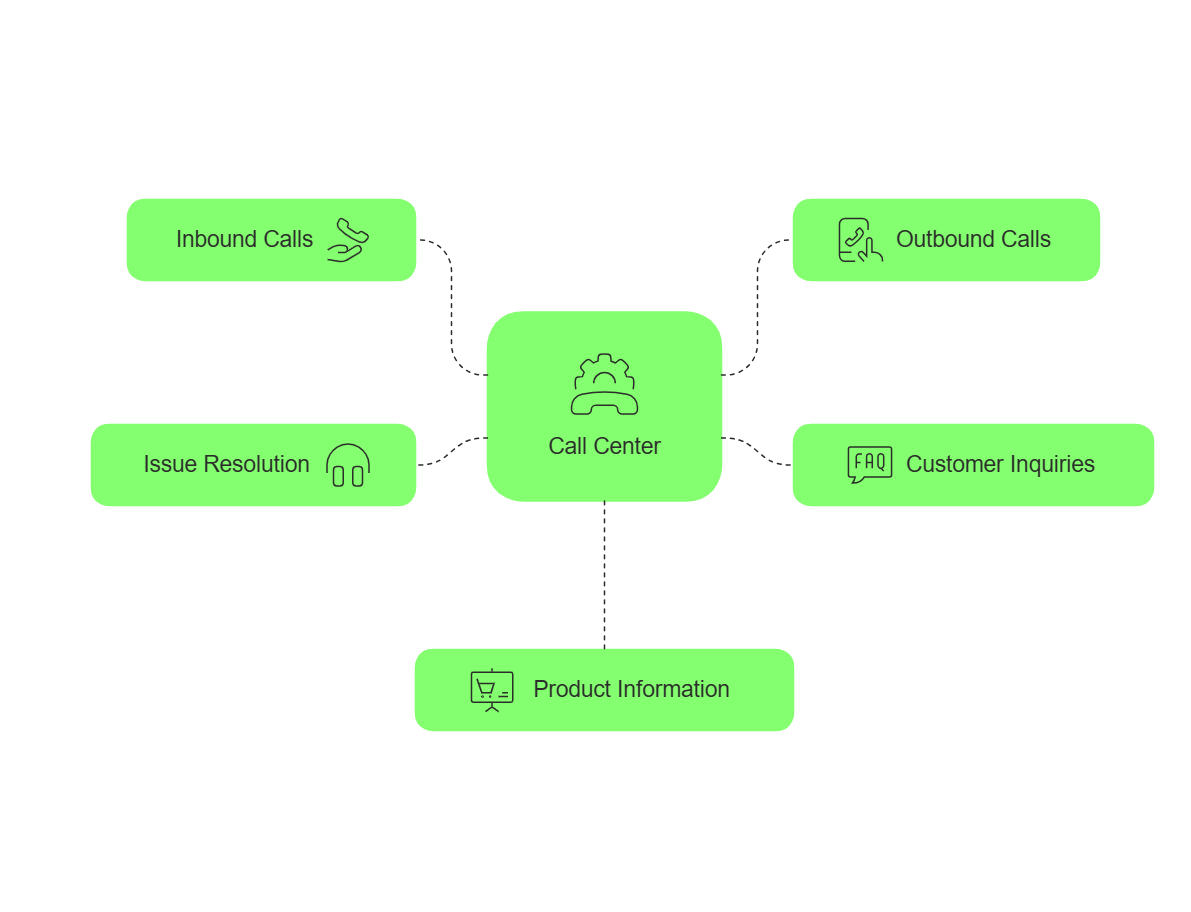
A call center is an important part of an organization that handles a large number of phone calls (both incoming and outgoing), especially the ones coming from prospects and customers. A call center primarily handles voice-based customer interactions. Agents in a call center manage incoming and outgoing calls to resolve issues, answer queries, or make sales calls. It is often used in industries like banking, telecom, and e-commerce where phone support is critical. Call centers can be of three types –
- Inbound call center– Handles incoming calls
- Outbound call center– Handles outgoing calls
- Blended call center– Handles both incoming and outgoing calls.
A call center typically manages the following type of calls –
- Technical support
- Complaints
- Inquiries about products or services
- Lead generation
- Telemarketing
- Customer retention
- Surveys
Fun fact: Did you know that there is a difference between BPO and call center too? The former focuses on back offices task like customer support or accounting while the latter focuses just on calls.
What is a BPO?
A BPO, or Business Process Outsourcing, refers to the practice where companies delegate specific business tasks or processes to external service providers. This allows organizations to focus on their core activities while benefiting from specialized expertise, cost savings, and increased efficiency. Common examples include customer support, payroll, and data management handled by third-party providers. Many businesses turn to BPO services to streamline operations and improve overall performance.
What is a Contact Center?
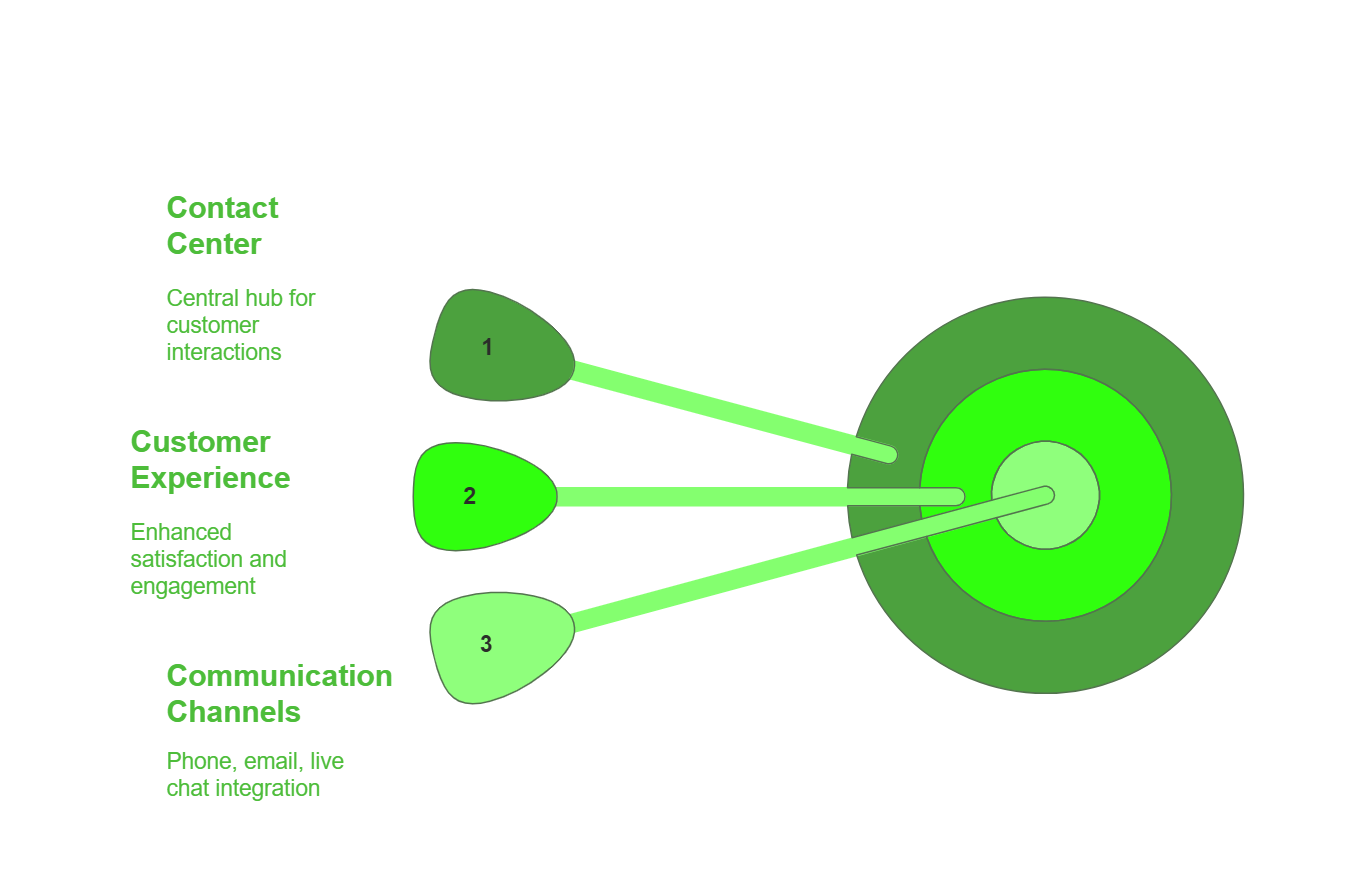
Like a call center, a contact center is also a department of an organization that handles communication across various channels. In other words, a contact center expands on the calling functionality of a call center to include other ways of communication modes such as online chat, social media, SMS, etc. The best part about the contact center is that it empowers your agents to personalize customer interactions so that they have a great experience with your brand.
Here is a sample workflow of a contact center –
- Order status updates are sent to a customer via SMS.
- The details around an upcoming event are shared with the prospect via push notifications.
- The reminder for the event is sent via email.
- The feedback session for the sale is conducted via call.
Call Center vs Contact Center: 7 Major Differences
As you can see from the above definitions, all call centers can be contact centers, but not all contact centers can be call centers. Let us now dissect the difference between call center and contact center.
| Parameter | Call Center | Contact Center |
| Communication channels | Voice | Voice, email, SMS, social media, chat, etc. |
| Key Goal | To provide instant solutions to the customer in a language they understand. | To enable customers to communicate with the brand on their preferred communication channel. |
| Skills needed for the agent | Only good communication skills are required. | Communication skills + Writing skills, social media etiquette, multi-tasking. |
| Key metrics measured | Average Call Abandonment RatePercentage of Calls BlockedAverage Time in QueueService LevelAverage Speed of Answer | Volume by channel first contact resolution by channel cost per contact by channel quality scores by channel customer satisfaction by channel available contacts by channel |
| Level of personalization in interactions | Low | High |
| Volume of data collected | Low | High |
| Complexity in operating | Low | High |
Business Success with Effective Contact and Call Centers
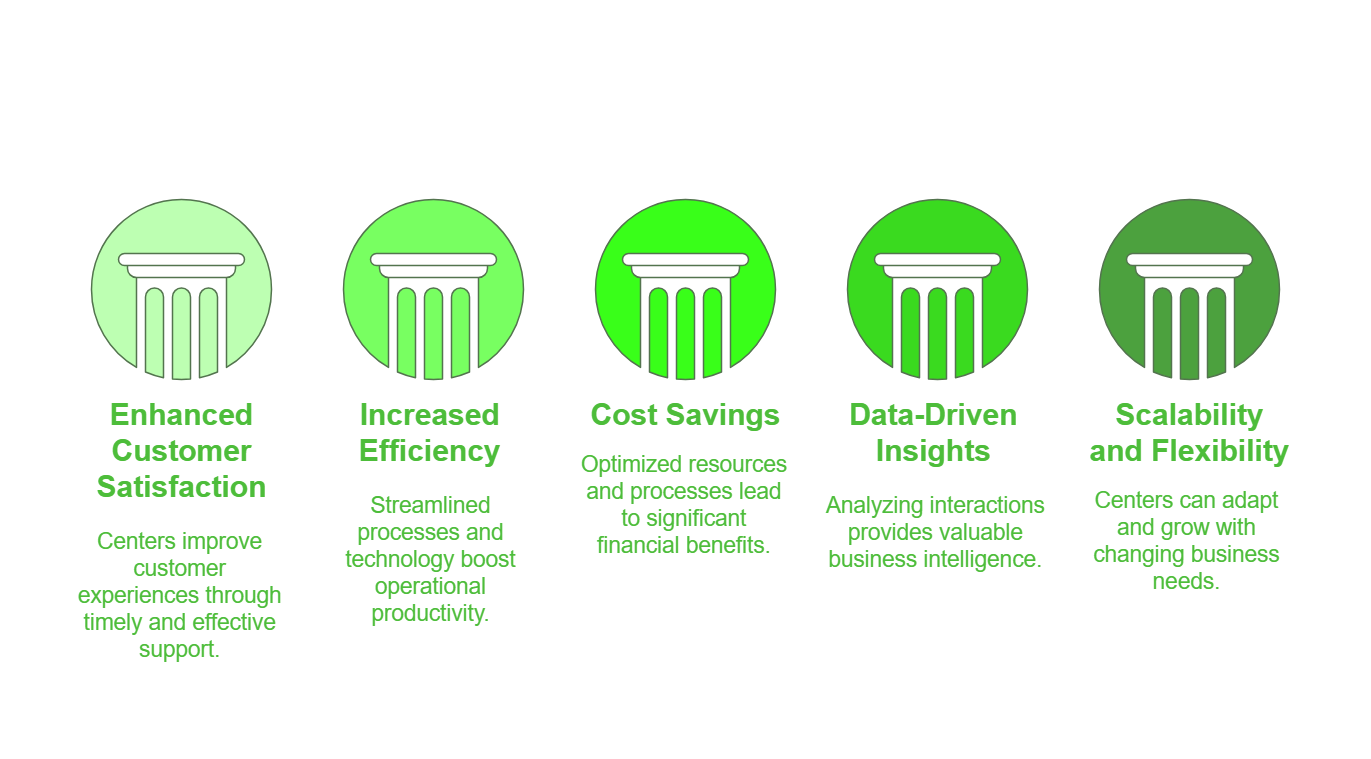
The Evolution of Customer Support: From Call Centers to AI-Powered Contact Centers
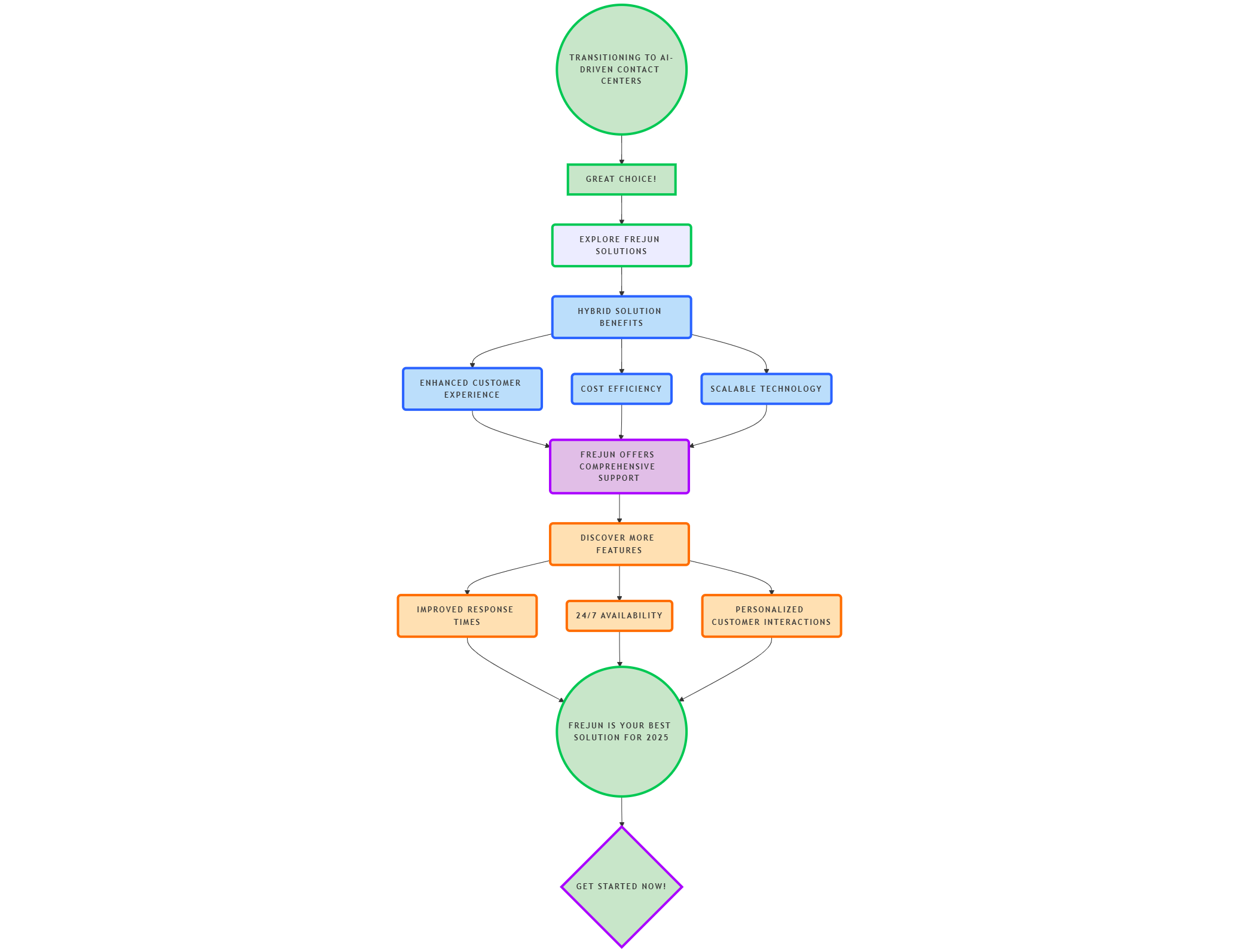
Reasons to Invest in a Contact Center and Call Center Solution
Now that you know the difference between contact and call center, the next thing to focus on is adopting a solution to run them efficiently. Remember – It doesn’t matter whether you choose a contact center or call center, it is important to invest in an appropriate tool to manage them.
To the unversed, a call center solution is a software that helps agents to manage incoming and outgoing calls more efficiently. A contact center solution, on the other hand, helps agents to manage all sorts of communication happening in multiple channels effectively. With that brief introduction, let us understand the reasons why you must invest in either of these solutions –
Why Invest in a Call Center Solution?
- Improves the Efficiency of your Agents: For the efficient functioning of a call center, agents must meet deadlines and offer instant solutions. This is made possible by a call center solution as it helps keep track of deadlines and schedules so that your agents can stay abreast with all the important things around an interaction or a deal.
- Captures Key Customer Information: Customer conversations are nothing but a massive goldmine for your organization. The intelligence you gather from these conversations can help you personalize experiences for your future prospects and improve the chances of conversions. Many call center solutions come with an in-built analytics engine that not only records calls but also offers smart insights that can be used for improved decision-making.
- Monitors Agents: Without a call center solution, it’s impossible for managers or business owners to keep track of their agents. Without it, you will never know how your agents are interacting with the callers or how many calls they are making in a day, or how much time they are spending on a call. By monitoring these metrics and agents’ performance, you can provide timely help to them and resolve issues before they cause any major damage.
Editor’s Choice: Cold Recruitment Calls Mistakes By Recruiters
Why Invest in a Contact Center Solution?
- Provides Faster Support: Let’s face it – today’s customers are highly impatient. They want solutions instantly. More importantly, they want solutions through the channel of their choice. This is where a contact center solution helps. It ensures that your team is available across all customer touch points and instantly responds to any queries, be it via mail or chat messages, or even phone calls.
- Improved Brand Visibility: When you are available across multiple channels, people are bound to notice you. A contact center solution enables your agents to proactively answer customer comments and complaints across all touchpoints. When you do that, your brand will automatically earn the tag of being ‘customer-friendly.’ It will attract even prospects who didn’t have an intent to purchase from you.
- Improved Sales: This is really a no-brainer. A contact center solution offers 360 deg intelligence of your prospects. Your agents will be in a better position to offer the right advice. They will be able to suggest the right solution that is tailored to their exact needs (thanks to the customer information they have). This can greatly increase the chances of conversion.
Conclusion
As businesses evolve in 2025, the customer experience is more important than ever. While call centers are still relevant for specific industries, contact centers are leading the charge in creating seamless, omnichannel experiences. By choosing the right solution for your business, you can not only meet but exceed customer expectations in today’s competitive market. Both call centers and contact centers are, without question, important for a business that indulges in a lot of interactions with customers. Whatever your choice, it is important to support your agents with a good solution that generates in-depth reports, sets up a routing system, schedules calls, etc. A platform like FreJun does much more than that. It offers many features that can power your calling process instantly.
To know more about FreJun, click here.
Further reading: Cloud Telephony: A Beginner’s Guide
Frequently Asked Questions
A contact center is better suited for omnichannel support. With FreJun, businesses can manage voice communication efficiently while integrating other tools for a seamless experience.
Yes, many businesses upgrade their call centers into contact centers by adding digital channels. FreJun helps with the voice part by offering transcription, call tracking, and CRM connectivity.
Not always. With cloud-based platforms like FreJun, businesses can scale cost-effectively while benefiting from advanced features like analytics and automation.
Not necessarily it depends on the platform. FreJun ensures high-quality voice calls, AI-powered insights, and real-time monitoring in both call and contact center setups.
Yes, and platforms like FreJun integrate easily with CRMs to keep communication logs centralized and accessible.
Contact centers are more scalable due to their flexibility. Growing businesses can automate voice tasks while expanding into other digital touchpoints.
These include AI, chatbots, IVRs, and analytics. FreJun specializes in intelligent call handling, transcription.
A writer/business analyst, who enjoys expressing creativity through painting during leisure hours. Embracing the 'Workcation' philosophy, he seamlessly blends the craft of writing with the allure of exploring new destinations.
